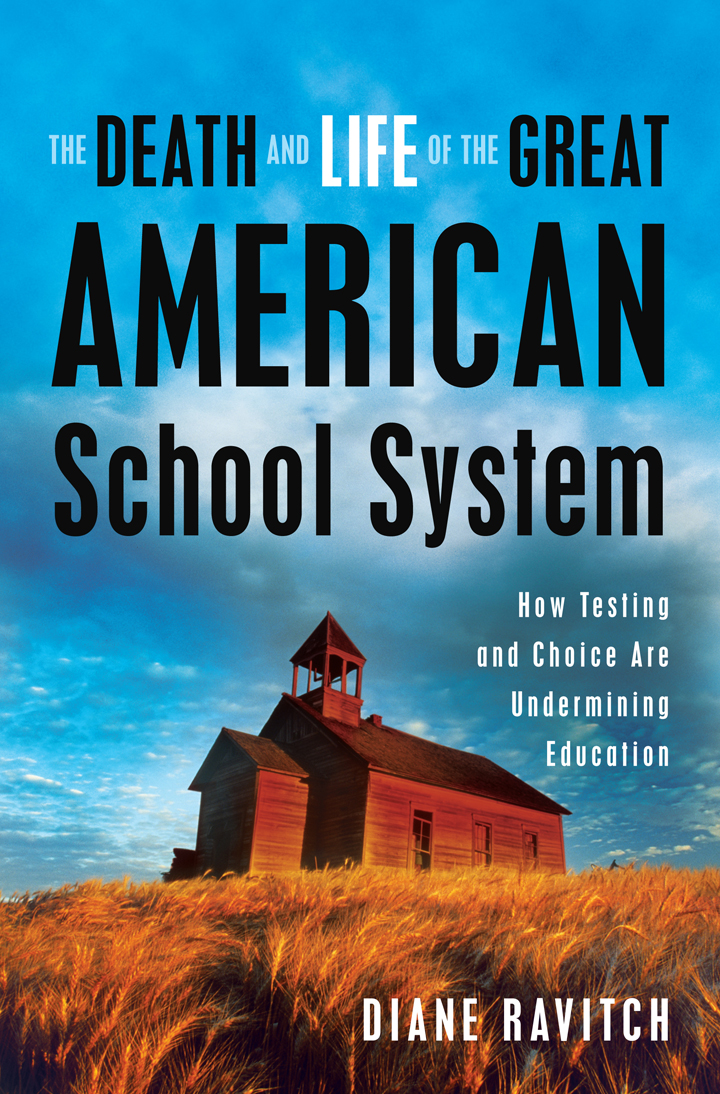Diane Ravitch, who was once a firm supporter (and a creative engineer) behind the notorious "No Child Left Behind", wrote this book because of her own enlightening experience with American education. After No Child Left Behind was passed, Ravitch watched as it took form and American education slackened. She realized that what NCLB was a flop and had to write a book stating why it was a flop and what it meant to American education.
Essentially, NCLB means exactly what it's title states - that no child should be left behind. President George W. Bush set a goal - that by 2014 all American students would be 100% proficient in subjects such as math, science, and reading. The reason NCLB was put into motion is because American students were not competing with students in other countries such as Finland and China. NCLB posed to test students in grades 5, 8, and 11 to test their understanding of reading, math, and science. These tests were multiple choice and held on special days during the school year. The results not only affected the students who took them but also the American teachers, also known as accountablity. Ravitch argues that this type of testing can not possibly measure the strength, or weakness, of a student's mind, nor can it measure a teacher's teaching ability. With NCLB in progress, children became fluent in good test taking methods instead of the actual subject matter the test was on. Teachers were judged by how well their students' test taking scores were instead of their students' actual performance in the class room.
"NCLB introduced a new definition of school reform that was applauded by Democrats and Republicans alike. In this new era, school reform was characterized as accountability, high-stakes testing, data-driven decision making, choice, charter schools, privatization, deregulation, merit pay, and competition among schools. Whatever could not be measured did not count." (pg. 21)Of course there is a lot more to the issue than that minuscule paragraph I just typed up. Other things needs this much detail. Without it, Ravitch would not have such great credibility. Her ability to write on all sides of the educational spectrum and formally contain her ideas in a concise manner is what made the book so interesting and engaging. I trusted Ravitch as I read.
are jumbled in the melting pot such as money, tenure, politics, etc. It is a lot to take in but Ravitch handles the subject matter with grace like a butterfly. Her attention to detail and facts soars on every page. She essentially covers ever nook and cranny on the topic of American education. Some may say it is a bit much, and I must admit - it is, but every detail counts and this subject particularly
"There are just so many hours and minutes in the school day, and if more time is devoted to testing and test preparation, then less time will be available to teach subjects that will not be on the state tests. Lack of attention to history, science, and the arts detracts from the quality of education, the quality of children's lives, the quality of daily life in school, and even performance on the tests. Ironically, test prep is not always the best preparation for taking tests. Children expand their vocabulary and improve their reading skills when they learn history, science, and literature, just as they may sharpen their mathematics skills while learning science and geography. And the arts may motivate students to love learning." (pg. 108).While the book's detail oriented style was excellent, it was also draining. Since I had to read the book for my class, I spent much of my time trying to read as many chapters a day as I could. Each chapter is a big chunk of the book and after reading two chapters in one day and starting a third, I had a hard time comprehending what the book was saying. It is a lot to take in and while I can't fault the book for facts, I have to admit it was a bit dry. There is a lot of repetition which is good but not for a light read. As a reader, you had better be aware of the time you are investing when reading this book. It is time well spent but make sure you are in the right mindset to spend it...otherwise you may come out of the experience extremely bitter.
Overall, the book was an excellent look at education but it was a lot of information being thrown at me which made the book an extremely difficult read but one I will not forget. I will give this book 4 out of 5 stars.



No comments:
Post a Comment